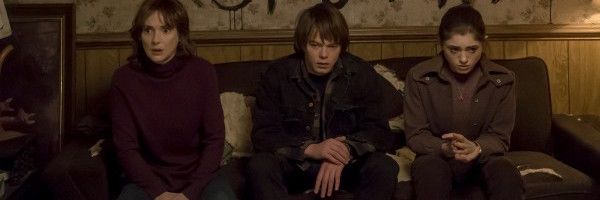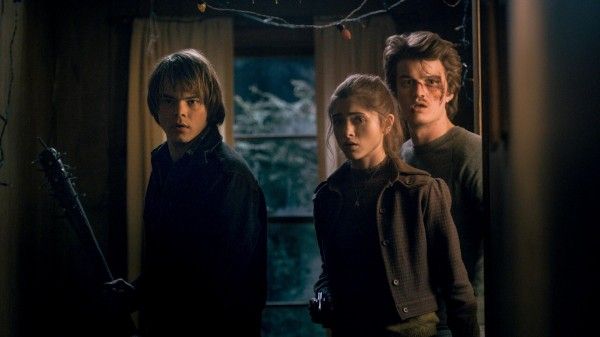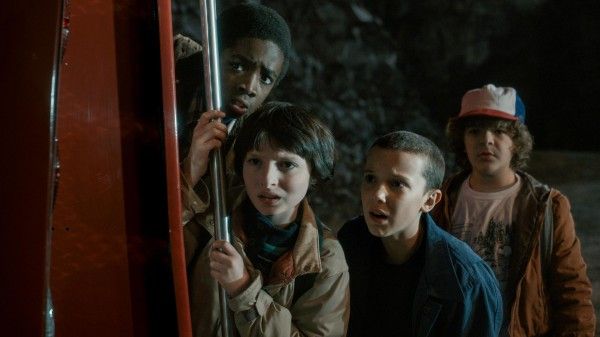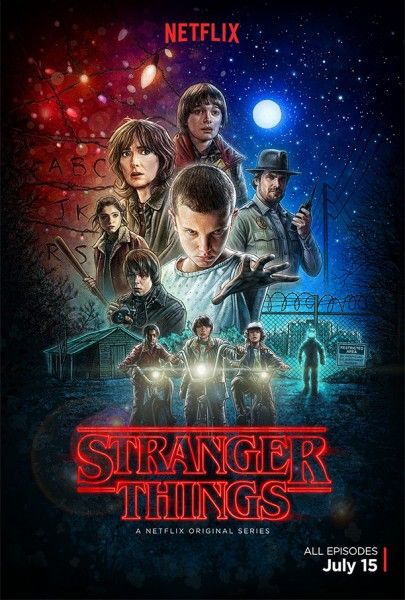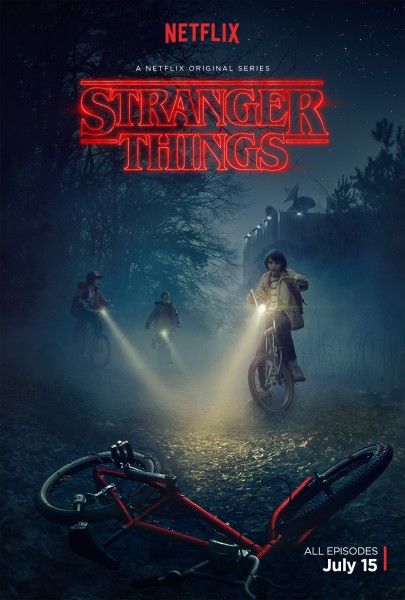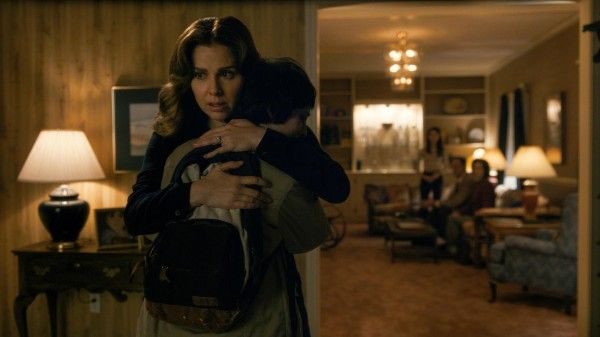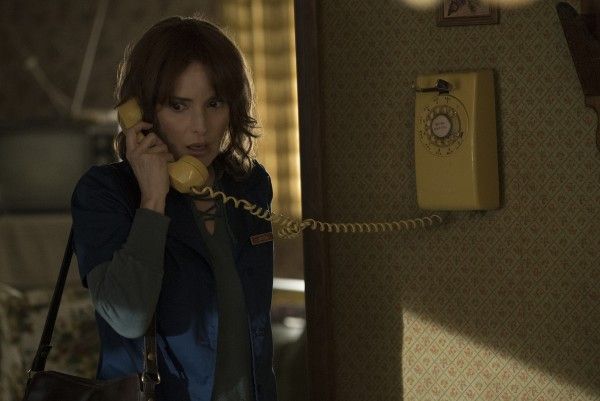(Editor's Note: Curious about Stranger Things? Here's our spoiler-free review of why it's worth the ride).
Stranger Things, the new mini-series from Netflix and the Duffer brothers (the fraternal duo behind Wayward Pines) wears its love for the films of Steven Spielberg on its proverbial sleeve. Set in 1983, the year after E.T. the Extra-Terrestrial was released, the series focuses on a trio of nerdy boys in Hawkins, Indiana who discover and befriend a girl with special powers after their good friend goes missing one night. The boys -- Finn Wolfhard's Mike, Gaten Matarazzo's Dustin, and Caleb McLaughlin's Lucas -- anchor this sci-fi-doused tale, but the Duffers also spin out to take in a full depiction of the town and the people connected to Will (Noah Schnapp), the missing boy. In the central relationship among the boys, who trade X-Men comics and worship at the alter of J.R.R. Tolkien, the Duffers and their creative team reflect and often rousingly conjure the thrill and eagerness for adventure at their age. And by taking in the full scope of the town, they see the psychological and sociological toll that Will's disappearance has on family and strangers alike.
These elements are primarily seen in the person of Joyce (Winona Ryder), Will's mother, who begins to receive phone calls that lead her to believe that Will is somehow trapped on some ethereal plane in their home. Meanwhile, her older son, Jonathan (Charlie Heaton), begins seeing a being with no face that he believes is involved with his brother's disappearance, a fact harder to believe when he is caught secretly taking photos of Nancy (Natalia Dyer), Mike's older sister. Whereas the science fiction elements of the story, including the girl, who takes the name Eleven (Millie Bobby Brown), feel familiar in the Spielberg-Dante-Zemeckis mold, the familial and neighborhood drama actually comes off as effective, nuanced, and unpredictable. Toward the end of the series, I actually found myself wishing that the science fiction stuff would subside and make way for an even more detailed, uncharted vision of Hawkins.
Indeed, the more the science fiction plot unfurls, the less fascinating Stranger Things becomes. When the series unveils a super-secretive governmental project and some unsightly, breathing portal-thing, one can almost immediately sense the endgame of all of this convoluted mishigas. This is not to say that the business with parallel dimensions and unknown creatures with startling powers is useless -- the series ends with ample fireworks and some truly exhilerating action. What it does do is render otherwise distinct material into a familiar stew of tropes that would make any fan of Super 8, Explorers, or Starman feel like they might have a case of deja vu. (It should come as no surprise that Shawn Levy, who directs two episodes here and serves as producer, is currently planning a remake of John Carpenter's superb Starman as this is being written.)
This is a similar issue that the Duffers, Matt and Ross, have faced on Wayward Pines, their eerie but overworked Fox series with M. Night Shyamalan, but Stranger Things has a far more robust and heartening human element than that series ever had. The series makes great hay of Joyce's partnership with the town's alcoholic chief of police, Hopper (David Harbour), who lost his own child years ago, but the show is at its best when it focuses on Nancy's burgeoning relationship with Steve (Joe Keery), a popular boy who takes an interest in her, and her guilt over her friend going missing, in a case similar to Will's, while she was making out with Steve. Thanks to some smart, sensitive writing, as well as Keery and Dyer's astute, evocative performances, the relationship between these two teens is both convincing and surprising, never painting Steve as a pure opportunist or Nancy as a sheepish goody-two-shoes. They make mistakes and admit their wrong-doings to one another, which is less true of Nancy's relationship with Jonathan, who she eventually partners with to investigate the disappearances.
Keery, Dyer, and Ryder give the most riveting performances here but the cast, on the whole, is thoughtful and engaging in their more human moments, and appropriately loud, fast, and physical when the monsters come out into the light. By the end of all of this, the backstories and what it all means for the population at large become pestering, especially because one can increasingly feel the strain to drag out the enigma as the show goes on. Would that the Duffers and their writers confronted all the exposition early on and had put more emphasis on how these people interact in a town that seems to have quite a lot of bad blood churning underneath it. And though there is plenty of references to President Reagan and the Star Wars program, the series fails to fully reflect the politics and societal panic of the time, to say nothing of the historical implications of governmental secrecy like the one Modine's nefarious doctor looks after.
The series is most endearing when the characters share in pop culture, which the Duffers tie directly to our most potent, warm memories. Early on, Will makes reference to the X-Men issue where Dark Phoenix first appears, which could be seen as foreshadowing, considering the superpowers that come into play, and it's telling that the password for Will's fort in the woods is Radagast. The power of art is felt most strongly, however, when Jonathan remembers playing The Clash's "Should I Stay or Should I Go?" for his younger brother, immediately defining a close bond and a sense of identity that Jonathan has embraced and Will looks up to. Later, in a quiet, heartbreaking scene, the song comes back to reveal Will's fate, and in a scene like this, the Duffers hit upon the power of pop music, as well as movies, books, and comics, to bring us closer together and to keep us mindful of our past. The Duffers nostaliga for the 1980s and the Spielberg way is admirable and even poignant at moments, but its also a limiter. Stranger Things ends up being an entertaining and impassioned throwback to the time when friendly aliens were all the craze, but there's a consistent sense that a far more imaginative and daring series hiding behind the monsters, whether they be human or otherwise.
★★★ - Worth the ride!

